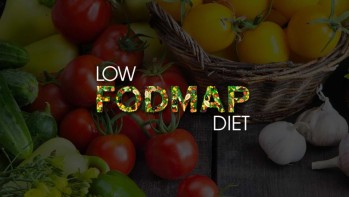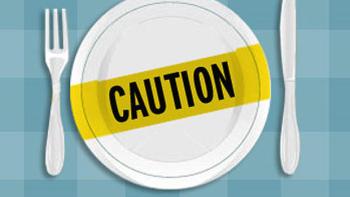Tuesday, the 27th, I had my appointment with the dietitian. This is the first dietitian I have ever seen, and I was extremely excited!
I had wanted to become a registered dietitian, until I took a class called “Intro to Nutrition Professions,” which pretty much said you always have to pitch your own jobs and I just don’t have the personality to do that – I barely have the personality to sell myself in regular interviews, let alone try to force people to hire me into a position I’ve created. I also wasn’t going to have the money to pay for the exams or internship, since I was already tens of thousands of dollars in student debt as it was. Sadly, I just kind of let that dream die instead of trying to figure out a way to make it work, but I still find nutrition absolutely fascinating! That fascination was definitely adding to the excitement.
My excitement was mainly due to the exciting potential of actually ending up on a track that might make me feel better, however, since most modern western medicine doctors don’t really focus much on nutrition. I have struggled with IBS-C my entire life (see “Personal Hell”), and it’s gotten worse since the fibromyalgia started, and even worse still since the dysautonomia. After you read the “Personal Hell” article, you’ll understand why I say it’s gotten to a point that I just can’t handle anymore. Thankfully, the high dose probiotics I’m on are helping quite a bit, but it’s still absolutely miserable. Recently, my nausea has also gotten completely out of control, and we’re thinking I probably have gastroparesis (or something similar), which makes eating extremely uncomfortable. And, while we discovered I don’t have hypoglycemia, I’ve been having some weird events – similar to hypoglycemic events – that seem to be tied to eating in some way. Overall, eating has become quite difficult, while not eating has become dangerous/uncomfortable; food is no longer much of a friend, and everything related to food just seems to be getting worse. I knew I needed some help!
Oh, and the allergies and eosinophilic esophagitis (EoE) are still a completely mystery and make my life complicated as well.
Dan and I were extremely excited, and he didn’t even have to get out of work to go since the appointment was Tuesday (his company gives everyone the week off from Christmas through New Year’s Day)! So off we went!

The appointment was overwhelming, to say the least. It was fantastic, so don’t get me wrong, but oh my goodness was it overwhelming!
The dietitian was a very nice woman, and didn’t seem all that much older than us (she may have been mid 30s at the oldest). One of the first things she said? “You have POTS? Oh! You’re the third POTS patient I’ve seen in the past week, and I have about ten POTS patients total!” Dan and my jaws just about fell off our faces! Needless to say, she knows all about POTS, which is amazing. We haven’t ever seen a doctor that was more confident in working with POTS patients! I have a slightly more complicated form of POTS (we are pretty sure I have hyperadrenergic POTS, but my doctor is being a jerk and won’t even test me for it), since my blood pressure and heart rate both go up and stay up, but she didn’t really seem daunted by that at all. I think she’ll probably be looking it up more, but she didn’t seem worried about that at all (she just doesn’t want me to add any salt with the hypertension stuff). She also knew all about IBS-C (obviously, she works in a GI office), EoE, and fibromyalgia. She even knew a bit about mast cell activation syndrome (MCAS), and was glad I’m going to be getting evaluated soon (she’s apparently sent some of her other patients to get evaluated for it). Dan and I left the office in complete aw at finally finding a doctor that knows all about all of my health conditions!
Why was it overwhelming? Well, she changed everything, like the title says. Yes, pretty much everything.
First off, she took me off the rotation diet I’ve been on for about a year. Thank goodness! I hated that stupid diet and had to keep taking “mental health days” by just ignoring it and eating whatever I wanted. She took me off the rotation diet because it really didn’t seem to be helping any of my symptoms much at all. So I no longer have to have “yeast days” and “cheese days,” I can eat [almost] anything I want on any day!
She definitely was not thrilled that I frequently skip meals or eat almost nothing at all (due to nausea), which is pretty much exactly how I knew she’d react to that information. So, she put me on a very strict eating plan. I am now required to eat within an hour of waking up in the morning, and then I need to eat every 2-3 hours until bedtime. I am not allowed to skip any meals. That means that, somedays, I may be eating as many as seven times. Obviously, they aren’t going to be as large as most people consider meals, but it’s still way more than I’m eating now.
My meal size also needs to be significantly smaller. This is due in part to the potential gastroparesis (GP), but it’s most likely going to stay that way because it’s pretty obvious I have some sort of motility problem. When I say significantly smaller, I mean, they’re going to be positively tiny compared to what “normal” people eat. I can still make dinner a little larger, but most of my meals need to be miniscule: a half of a banana and a Babybel cheese (or string cheese) is one meal. Oh, and every meal has to have a carbohydrate of some kind (fruit counts) and a protein of some sort. I have tried starting on the timing and smaller meals almost immediately to help get in the habit, but it’s been a busy two days.
The biggest change, however, is in what I’m allowed to eat. First off, she said food allergy testing (done on the skin) is extremely unreliable. So she doesn’t necessarily want me to act like I have any of the food allergies I was on the rotation diet for (beans, aged cheese, yeast, chocolate). However, she doesn’t want me to add in the things I’ve been avoiding for years, due to oral reactions, until we get some results from the rest of the new diet; these “allergens” are tree nuts (except coconut), peanuts, and cabbage. Either way, with the potential for GP, she wants me to completely avoid whole nuts for now because they’re extremely hard to digest. So what is this new diet?

Image: Organics.org
I’m now on the “low FODMAP diet.” When she was first describing the diet, before she went to get the handouts, I had a suspicion it was going to be the FODMAP diet… and I was right. It’s an extremely strict diet. In fact, we went grocery shopping after the appointment to get foods I was allowed to eat, and it took us about four hours because of all the new restrictions (and we had to check everything against the handouts because we aren’t used to it yet). Thankfully, she gave us a ton of handouts to help us out! There is a “High FODMAP” (aka: avoid) food list, a “Low FODMAP” (aka: eat these things) food list, a shopping list with many brand suggestions in all the different categories of food, a “FODMAP Label Reading Tips” list (which shows common ingredients that are low FODMAP and high FODMAP), some FODMAP-friendly recipes, a long list of low FODMAP meals (breakfast, entrée, and snacks) with how-tos for the suggestions, how to add flavor to foods while avoiding FODMAPs, and tips on how to dine out and eat “on the go!” These handouts have a ton of really helpful information in them, and really helped make the grocery trip a little easier.
You can see some of these handouts, and learn a lot more about the low FODMAP diet, here: http://www.katescarlata.com/lowfodmapdietchecklists (It’ll be much easier than me trying to type it all out in this post.)
The “F” stands for fermentable, and the other words are all really long scientific words that I can’t actually remember right now… but the “F” is the most important, really. Basically, anything that ferments in the gut is bad and not allowed. This means that many forms of sugars, both natural and manmade, are not allowed (nor the foods containing them). This is NOT a sugar free diet, and I can still have many different fruits and many carbs, but it eliminates a lot of the sugars that are difficult for the body to digest. It also gets rid of other difficult to digest and inflammatory foods, like gluten. Yes, I’m now on an even more intense version of a gluten free diet than I’ve ever been on before. (Technically, the low FODMAP diet is not a gluten free diet, but I’m not allowed to have the glutenous grains at all due to their sugar contents, so it ends up being a mostly gluten free diet.) At least, for the most part. There are a few exceptions to all of these rules, mainly that if the food has already been fermented (like sourdough bread, kefir, and cheese) then I can eat it. Some things I can have in very limited quantities, such as being limited to only one proper serving of fruit (like ½ a cup of berries) per sitting.
Unfortunately, some of my absolute favorite foods have been eliminated. I cannot eat any legumes at all, which means that all my beloved refried beans, chilis, etc are off the table. The hardest fruit that has been eliminated, for me, are apples! I LOVE apples!!! While I don’t eat whole apples very often, I eat a lot of stuff that has apples in it! And, unfortunately, apples are strictly forbidden because they’re a major GI irritant. Three of my favorite teas contain apples, I love applesauce, and we just bought some apple butter in November and it’s only had about ¼ of the jar used! I do have some time to still eat these things, because we decided to really go all out with the new diet starting on Sunday (the first of the year) instead of starting immediately so I can help Dan finish off some leftovers to prevent them from spoiling. I am, however, trying to start introducing new foods, because I am an extremely picky eater and introducing new foods is always a struggle.

Image: The Dolce Diet
I need to be on the diet, strictly, for at least two weeks. If I am not seeing any difference at all in my symptoms then I’m supposed to email her at the end of the two weeks and she’ll adjust it. If it seems to be helping, even the tiniest bit, then I will be staying on the diet for an entire month. Apparently, after that month, we will revisit the diet and she’ll modify it somehow. (I’m hoping the modification means it will get a little less restrictive; I suspect it’s going to be kind of an elimination diet style where we being reintroducing one category at a time and see how my body reacts.) While the types of food may change, and maybe even the portion sizes will change, this new timing is something I need to get used to and strictly adhere to for the foreseeable future.
We are also increasing my daily magnesium from 250mg (one pill) once a day, to 750mg (three pills) once a day at dinner time. She wanted me on 800mg of magnesium citrate, but she said magnesium oxide was fine, and the pills I’d been taking were the only magnesium pills we could find that had ingredients that agreed with the low FODMAP diet. Since they are magnesium oxide, and only came in 250mg tablets (all the other strengths had glycerin), I am just going to take the three pills and see if that gets the desired result – it’s supposed to help treat my IBS-C.
Oh, and I have to work on increasing my daily fluids up to a minimum of three liters a day. The fluids should help my POTS quite a bit, thankfully. But until I’m more used to it, I’ll probably feel like I’m drowning all the time.
Low FODMAP Diet Posts:
That is so interesting about the apples, I had no idea they were such a huge GI irritant. I hope you have a wonderful experience with the new eating plan! Light and love!
LikeLike
I was so upset when she said that!!! But not completely surprised since they have so much fiber in them. Oh well! Glad to share the knowledge ❤
Thank you for the best wishes! Much love!
LikeLike